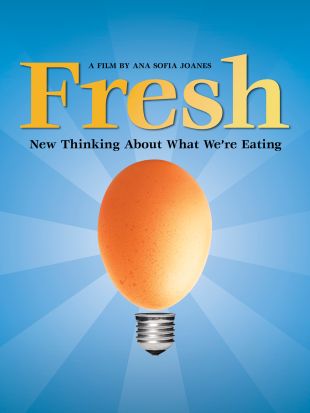
Following an onslaught of recent documentaries unveiling food-industry evils -- most of which were bold and uninhibited enough to make Upton Sinclair proud -- moviegoers might balk at the thought of seeing yet another exposé on this same subject. But Fresh, a 70-minute outing by Swiss-born filmmaker Ana Sofia Joanes, deserves its title, in the sense that it offers a fresh break from the tedium of witnessing one food-industry devastation after another. In lieu of delving into this theme as prior films have, Joanes merely grazes against it. Her real focus lies elsewhere: in constructing a series of mini-biographical profiles of iconoclastic American farmers and entrepreneurs who have bucked the status quo by eking out new and radically different means of sustaining healthy crops, livestock, and packaged victuals. Subjects include Russ Kremer, a hog farmer who nearly died from an antibiotic resistant infection thanks to an injury from a pig, and subsequently created an antibiotic-free farm; Will Allen, a former professional basketball player from Wisconsin who launched a nonprofit called Growing Power to teach Middle Americans sustainable farming; David Ball, an owner of a chain of Missourian supermarkets that only stock locally produced, healthy food and specialty products; and many others.
By a long shot, this ray of hope represents the film's greatest asset -- the streak of originality that not only makes Fresh pleasant to watch, but gives one a sense of unlimited potential for growth and social change within the food system. One walks away from it not only believing that food-industry desolations can be overcome, but more or less grasping how each consumer can contribute to making this happen -- by making conscientious, informed choices in terms of the food bought and consumed, and veering toward organic, locally grown, pesticide-free, and antibiotic-free products. To Joanes' credit, this represents the rare documentary with environmental or ecological themes that manages to cut through the political rhetoric and simply present bare, unvarnished facts. We never feel like we're watching a polemic -- merely truth, emergent from a director who has researched all of the angles and provides one illumination after another. The film retains other strengths as well; in particular, it's beautifully shot by Valery Lyman, and edited together so swiftly by Mona Davis that one fails to even notice the transitions.

Fresh's only real flaws are twofold. First, at barely feature length, it could stand to be much longer, more thorough, and exhaustive than it is; the interviewees on hand are so fascinating and engaging that we long to know more, to sense more depth and grasp more complex ideas at the heart of the movie's arguments. (It would make a magnificent TV documentary series.) And, in keeping with the film's all-too-brief running time, Joanes seems to lack the ability to convey some of the scientific notions at the heart of the material with complete clarity. Even though we grasp the overarching push toward organic and away from industrialized food (as mentioned), the director rushes through such concepts as rotational grazing, diversity of livestock, and antibiotic resistance so quickly that the film, in its weakest moments, tends to grow a bit confusing and could benefit from longer and more careful expostulation. Fortunately, these flaws, in the final analysis, don't outweigh the film's many assets, which are strong enough to warrant giving the material a serious look.
